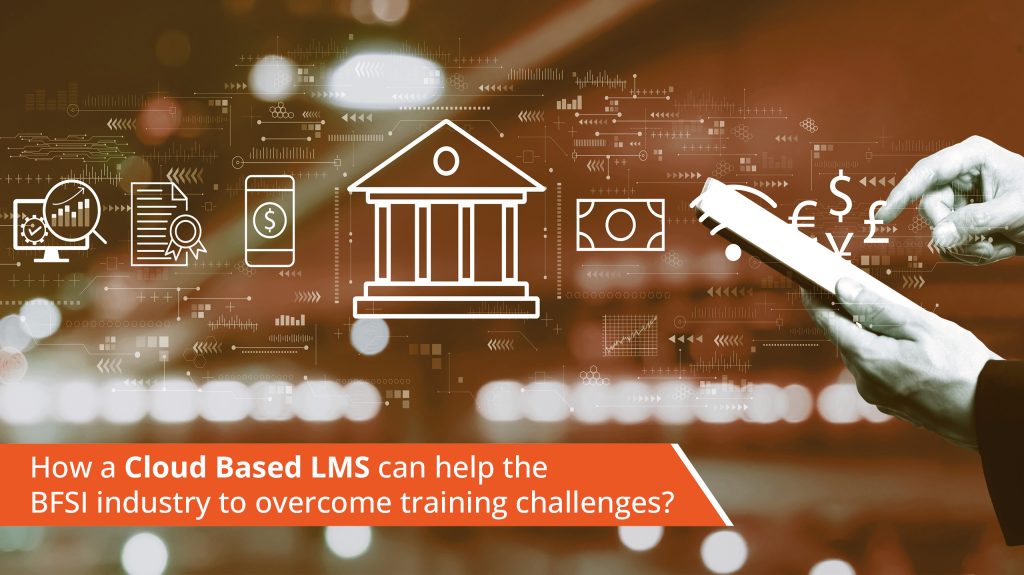The banking industry has seen a lot of changes recently due to new regulatory reforms and a significant increase in the use of digital communication. There has been an increase in customer demands too due to the competitive environment with so many new banks coming up. The competition and automation of working ways have made the BFSI sector think and implement new ways to achieve business growth. Indeed, the banking industry has started deploying technologies and implementation of cloud based LMS to meet customers’ requirements.
In the recent past, the BFSI sector has been stressing about hiring highly skilled people for roles who can handle this new technology. The companies, therefore, want their employees to undergo training through a learning platform that includes skill assessment modules to test employees’ knowledge and be ready in sync with the industry regulatory and compliance needs.
Moreover, the employees must be trained and upskilled, hence a cloud based LMS is beneficial where employees can complete the training online as compared to in-person training. As per reports, about 42% of organizations save their costs with the use of the LMS.
BANKING SECTOR TRAINING CHALLENGES
Frequent regulation changes
This is very common in the banking sector to face multiple regulation changes throughout a single year, so it’s important to be able to update content quickly and easily without having to redesign entire courses.
The banks also need to ensure that new information reaches the employees quickly.
Ensuring all employees meet training standards
It’s vital that all staff complete their training in full and to a satisfactory standard, and that any gaps are spotted and dealt with speedily. When training is being delivered on a large scale, often nationally or globally, it can seem like a big challenge and it’s important to spot gaps and ensure everyone is on the same page.
Resistance to change
Many organizations in the banking sector include staff that has worked in the industry for many years. Due to this long tenure, comes a resistance to change with new programs and training plans rolled out. Thus, already adoption of long-standing processes or traditional ways mostly causes issues.
Learning on the go
The bank officials, mainly the sales team and other field staff look to complete their learning while traveling or as per their availability. Thus, there is a need for smart device-based learning which provides them the ability to learn on the move.
ROLE OF CLOUD BASED LMS
Every organization in most sectors faces employee training challenges and to overcome them, the organizations implement a learning platform such as cloud based LMS. Let’s go through the ways how a featured loaded LMS can sort out these challenges.
Adherence to Internal and regulatory standards
The cloud based LMS offers the flexibility to design and deploy content to targeted users. This would be helpful to a multi-national institution that would require to adhere to multiple regulations. A well-designed LMS can help the institution tackle this problem efficiently and effectively.
Availability of training material on the go
In this era of smartphones, users want to access the training material on the go as this saves their time and makes them learn new things quickly. An LMS ensures that the training material created by the learning and development team is made available to the users on the go.
Engaging the learner
Learner engagement is key to any organization’s success as the more happily employees learn, the more quickly they will implement those learning and lead towards achieving business growth. A cloud based LMS with features such as gamification and social learning supports the requirement to ensure user engagement and give detailed reports on the engagement of the user.
Measuring Training effectiveness
A cloud based LMS help in measuring the effectiveness of all its training initiatives across courses, groups, locations, regions, departments, etc. The leaders can make decisions based on the data set generated on training completion, employees’ feedback, and other parameters.
Reporting and Analytics
The measurable impact in terms of data plays an important role, thus cloud based LMS effectively creates reports that could result in effective learning interventions. This includes the creation of customized reports and readily available dashboards.
The LMS streamlines the overall learning process, reduces the cost involved, and ensures the organization’s growth in an impactful way. G-Cube LMS for organizations has helped to build a culture of continuous learning for better growth and opportunities. Talk to our learning consultant to know more about how an LMS helps in increasing employee engagement and creating a competitive learning environment for your workforce.








